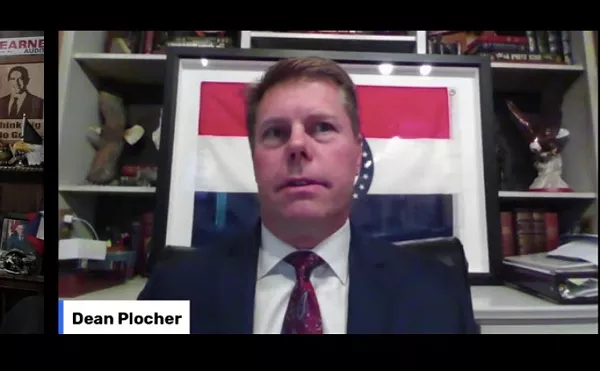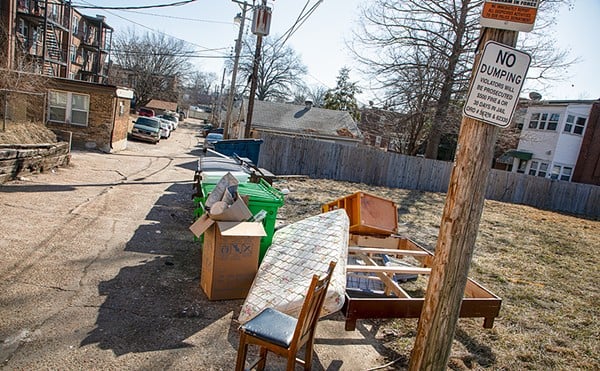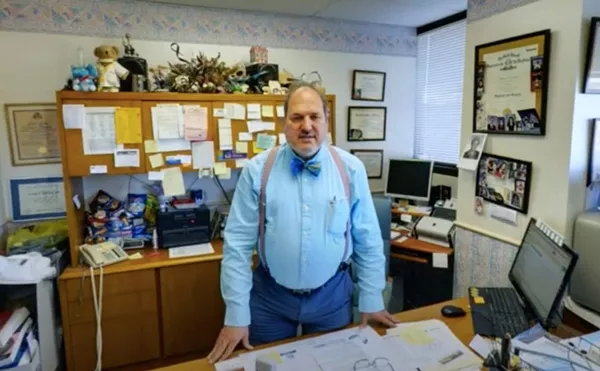
The U.S Supreme Court ruling striking down the Defense of Marriage Act last month does not have direct consequences for states like Missouri that have constitutional bans on same-sex marriage. But the DOMA decision, perhaps in unexpected ways, has impacted various LGBT rights efforts here. For example, we reported last week on one St. Louis gay couple who tied the knot in Iowa and can now apply for a marriage-based green card -- one of the men is from Singapore -- that would allow them to live together full-time in Missouri.
And now, the Supreme Court ruling, which allows same-sex couples to receive federal benefits, is also affecting the ongoing legal battle of Kelly Glossip, a Missouri man fighting to access "survivor benefits" available to spouses of state troopers killed in the line of duty.
Glossip, as we've chronicled here, lost his partner of fifteen years, Dennis Engelhard, on Christmas Day of 2009. The death of the state trooper -- who was killed responding to a traffic accident -- launched a lengthy dispute between his surviving partner and the state of Missouri in a case that worked its way to the state Supreme Court this year.
See also: - Gay Missouri Trooper Killed in Line of Duty Leaves His Partner Without Benefits - Kelly Glossip: Same-Sex Partner of Trooper Killed in Line of Duty Sues for Benefits - Missouri Gives Gay Trooper Killed a Highway, Still Denies Benefits to His Partner
The American Civil Liberties Union of Eastern Missouri has been representing Glossip in this case and argues that he has a legal right to access the benefits in question. (He is not challenging the state's marriage ban, but asking the state to provide committed domestic partners the same survivor benefits it gives to heterosexual spouses of troopers killed while on duty).

If they were a straight couple, Kelly would be entitled to an annuity of 50 percent of Engelhard's average salary, the ACLU explains.
The Missouri Supreme Court, in response to the DOMA ruling, recently requested that all parties in the Glossip v. Missouri Department of Transportation case submit additional briefs -- essentially giving the ACLU an opportunity to outline how the U.S. Supreme Court Ruling should be considered in this state-level battle.
"This just gives us added reasons to be guardedly optimistic," Grant Doty, staff attorney with ACLU-EM, tells Daily RFT. "We think it is very encouraging."
Doty says that the ACLU believes it has a strong case -- that the denial of benefits in this scenario is unconstitutional -- regardless of the ruling at the federal level.

Still, he notes, "The U.S. Supreme Court ruling in the DOMA case provides the Missouri Supreme Court additional rationale for ruling in Mr. Glossip's favor."
The ACLU has filed a brief outlining this argument, on view below. (PROMO, the statewide LGBT advocacy group in Missouri, has also filed a similar brief).
While the U.S. Supreme Court case (Windsor v. United States) concerned the denial of federal benefits to married same-sex couples, Glossip's case relates to the denial of public employment benefits to committed same-sex couples in a state that bans gay couples from marrying or having their marriages from other states recognized, the brief notes.
"Despite this difference, the principle is the same: ... [W]here the purpose and practical effect of a law is to disadvantage same-sex couples, the law discriminates on the basis of sexual orientation," the ACLU brief says.
Other highlights:
Windsor confirmed that a law motivated by a legislative "desire to harm a politically unpopular group" fails equal protection review under any level of scrutiny....Windsor and its progeny provide additional support for the conclusion that this Court should apply heightened scrutiny to review the constitutionality of the survivor benefit statutes under the Missouri Constitution.
Moving forward, Doty explains, the state can file a response to the ACLU's brief, at which point the ACLU will have another opportunity to reply. The decision from the state Supreme Court will come after that and could happen anytime August and onward.
The DOMA decision can only help in the Glossip case, Doty emphasizes. "Our case was strong even without the Supreme Court ruling."
Here's the full ACLU brief.
Kelly Glossip - Additional Brief
Send feedback and tips to the author. Follow Sam Levin on Twitter at @SamTLevin.





